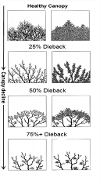Ash is the third most common broadleaved tree in Britain and is widespread throughout Perth and Kinross.
Importance of Ash trees
Ash trees are important for biodiversity and carbon sequestration, with over 1,100 species of invertebrates, mammals and flora being dependent on Ash for their survival. Additionally, Ash is utilised in many manufacturing processes and is considered the best for firewood. Ash is also important to flood prevention, being a common bankside species that functions as a stabilising element on waterside land. There are an estimated 9,400 mature Ash trees either on Council-owned land or adjacent to public roads (excluding trunk roads) in Perth and Kinross, making it one of the more prevalent and noticeable trees in our local landscape.
Ash Dieback disease
Ash or 'Chalara' Dieback (Hymenoscyphus fraxineus) is a destructive fungal disease which affects all Ash species (Fraxinus spp.), but in particular the native Common Ash (Fraxinus excelsior). As the disease progresses, the wood becomes brittle, branches and large limbs will drop from the trees and in severe cases of the disease, the tree will die. The brittle wood in trees with advanced Ash dieback makes traditional felling methods (such as felling at the base using a chainsaw) a risk to those felling them and therefore costly to remove. The disease causes leaf loss and crown dieback in affected trees and usually leads to tree death. Some trees are more resistant than others and it is expected that some ash trees will survive.
Stages of Ash Dieback

Detailed information about the disease can be found on the Scottish Forestry (opens new window) website.
For more information about managing Ash Dieback disease on private land, visit Forest Research (opens new window) or contact a professional Tree Surgeon or Forestry Professional.
Ash tree management by us
In 2025, we published an Ash Dieback and Roadside Tree strategy (PDF, 888 KB) outlining the steps being taken by us to manage the disease on our land.
If you are aware of a dangerous Ash tree on Council-owned land or next to a public road, please report this to us via MyPKC (opens new window) or by phone on 01738 475000.




